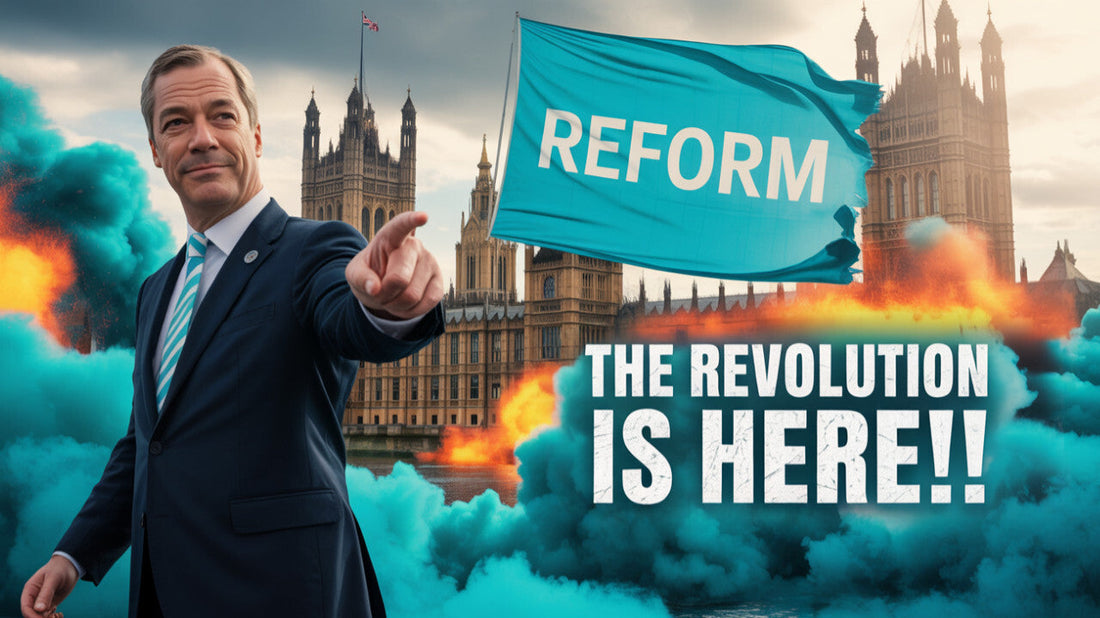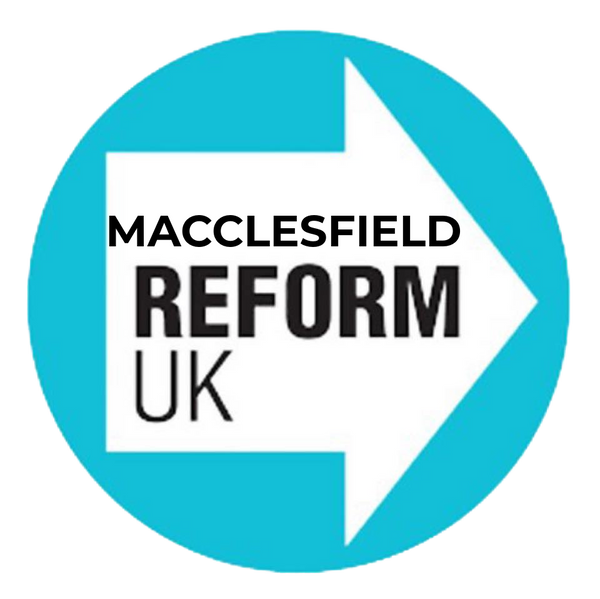
The REAL British Revolution Is Happening Now
Share
Let's talk numbers. Forty-one percent. That's the staggering chunk of last May's local election seats we won. Our party has only been around for about six years, and we proudly call ourselves "Reform." If that doesn't make you sit up and take notice, I don't know what will.
While the grand halls of Westminster echo with the usual shouts about photo-ops and political point-scoring, ordinary voters out there just quietly, yet decisively, handed over control of things like bin-collection budgets, housing licenses, and a whopping £7 billion worth of service contracts. And who did they hand them to? To local councillors like ours, who ran their campaigns on a simple, powerful promise: "We'll do it ourselves."
If you thought Brexit was the big shake-up, the seismic shift that truly mattered, then let me tell you, you've missed the real story, the one we are creating right now, far from the glare of national headlines.
The Westminster Illusion
Remember Brexit? It was supposed to be the ultimate reset button. "Take back control" of our borders, our laws, our money – a simple slogan that we all believed in. But let's be honest, how has the establishment delivered on that for us? Take a look around. More than 32,000 people have arrived by small boats so far this year. That's a stark contrast to the 8,466 crossings recorded back in 2020.
They ended free movement for EU citizens, but their departure from EU cooperation mechanisms like the Dublin Regulation has, ironically, made it harder to control irregular migration effectively, leading to record-high net migration figures post-Brexit, with net international migration driving a population increase of over 755,000 in the year to June 2024.
Then there's the cost of living. While average weekly earnings for regular pay saw real-term growth of 0.7% between May and July 2025, many of us still feel the pinch as stubbornly high wage growth keeps interest rates on hold.
If you try to ring your GP in the UK, you're still facing challenges as practices struggle with a rising number of appointment requests and tasks passed on from other healthcare providers. The referendum was a moment of national decision. Yet, despite all the promises, central government expenditure was provisionally estimated at £464.1 billion in just five months to August 2025, and the broader public sector is set to spend £1,347 billion in 2025/26. Meanwhile, potholes still bloom like daffodils on our roads.
Something just isn't clicking, is it? People haven't changed their minds on sovereignty; they've simply come to a quiet, unsettling conclusion: Parliament isn't where the real power lives anymore.
Bypassing the Circus
So, what happens when people realize Westminster isn't delivering? They start looking closer to home. And that's where our practical revolution begins. In Hartlepool, for example, the council has bypassed the usual bureaucratic merry-go-round and now outsources its beach-cleaning duties to a local fishermen’s cooperative, formed just last February. The tender? Written in plain English, fitting snugly on two sides of A4. No need for legions of lawyers or endless jargon.
Over in Stoke, our planners didn't just passively accept a national warehousing quota. They pushed back, rejected the central directive, and instead transformed an abandoned pottery into 51 low-rent flats, managed entirely by a residents’ society. It’s about local needs, local solutions, not top-down dictates.
And East Suffolk? When their budget for youth services – ring-fenced by Westminster, then cruelly halved – faced a crisis, the district didn't just throw its hands up. They got creative, topping it up with an innovative 5% tourism levy they invented themselves.
What's truly remarkable about these initiatives is that none of them required an Act of Parliament. They didn't need grand pronouncements from Downing Street. They simply needed councillors with the vision and the guts to use existing bylaws in ways the civil servants in Whitehall probably never even dreamed of.
It’s a quiet assertion of local control, proving that real change can happen when communities decide to simply get on with it. This is community empowerment in action, the kind of grassroots decision-making we champion, transferring assets back to local control.
The Rise of Local Reform
Our emblem might be a distinctive purple, but on the ground, in the towns and villages, our movement looks a lot more like hi-vis jackets and muddy boots. Who are our new councillors? They're not your typical career politicians. We’re talking about a former milkman who still knows every doorstep in his ward, a Ukrainian baker who gained citizenship in 2021 and is now serving her adopted community, and a 24-year-old apprentice plumber, bringing a fresh, practical perspective to local governance.
Our manifestos aren't identical – some champion lower business rates, others demand a freeze on second-home purchases – but we all share one fundamental, powerful instinct: if the town hall, as it is, can’t fix it, then the town will. This isn't just about sending a message to Downing Street anymore; it's about taking the keys, locking the gate from the inside, and running things differently.
Our growth is undeniable. We've reached an impressive 250,000 paid-up members as of September 26, 2025, a significant leap from earlier figures. While that's still smaller than the traditional big two parties, the momentum is palpable. In May's local elections, we secured a projected national vote share of 27% and won 41% of the seats up for election, taking control of 12 councils. In Kent, we even won a majority of 57 out of 81 seats with 37% of the popular vote. This isn't the fleeting protest vote of the past; this feels different.
This is a sustained, grassroots movement focused on tangible local change, reflecting a deep-seated desire for our communities to take charge of their own destinies.
What We're Actually Changing
So, what are our local reformers actually doing? It's not about grand, sweeping national policy; it’s about practical, impactful changes that people feel directly.
- Procurement: Take Boston borough, for instance. We've smartly broken down large contracts into smaller £50,000 lots. Why? So local firms can actually bid for them without needing to hire an expensive London lawyer, keeping money and jobs within the community. It's a simple change that levels the playing field for small businesses.
- Planning: In North East Lincolnshire, we're giving residents a real say. Streets can now draw up their own "neighbourhood design codes," effectively giving locals a veto over those generic, boxy developer clones that pop up everywhere. It means communities get to preserve their character and decide what their area looks like, not distant developers.
- Budgets: Burnley has embraced participatory budgeting for its parks. Imagine that: 3,200 residents, voting online and in church halls, decided to fund BMX track lights instead of hanging baskets. It's direct democracy at its most granular, ensuring public money goes to what the community actually values and uses. This is the community empowerment we believe in.
- Services: And in Swale council in Kent, we’re getting creative with service delivery. They pay a volunteer handyman £30 per call-out, which is half the cost of the previous contractor. This simple, community-focused solution has slashed grass-cutting waiting times by a remarkable 40%. These might sound like tiny tweaks, but you feel them when the playground gate finally closes properly, or when your local park is well-maintained, or when a local business thrives because it finally got a fair shot. They're tangible improvements that build trust and demonstrate local efficacy.
The Pushback
Of course, not everyone's cheering. As our localist revolution gathers steam, the establishment is getting nervous. District auditors have raised concerns that our micro-contractors—often small local businesses or cooperatives—sometimes lack the comprehensive insurance coverage of the large, established firms they prefer. It's a predictable point about risk from the box-tickers.
Teachers’ unions, meanwhile, fear that if every borough starts writing its own curriculum add-ons, it could lead to patchy provision. They argue for a unified standard, worried about losing their centralized control over what all children are taught. And then we hear the concern that devolved spending can entrench existing inequalities. They point out that affluent Surrey raises more in parking fees than Darlington's entire cultural budget. This is a problem created by the current system, not by localism. Our goal is to empower all communities, not just the wealthy ones.
Then, there's the ever-present culture-war attack. A few of our councillors have, perhaps predictably, been attacked for speaking out against anti-car 15-minute-city rhetoric; one even got smeared for suggesting that cameras on lampposts are "WOKE spies." They twist plain speaking to distract from the real issues.
If the old guard thinks competence will falter or we'll get bogged down in squabbles, they're mistaken. They hope voters may swing back to the old, familiar brands, but we believe that once people see real results, they won't want to go back.
Could It Go National?
Ah, the question Westminster watchers love to dissect. The answer is yes. The latest in-depth polls show the political ground shifting under our feet. One major YouGov MRP poll projects that if an election were held tomorrow, Reform UK would win 311 seats, making us the largest party in a hung parliament and putting us on the brink of an outright majority. Other polling even suggests we could be on course for a landslide majority of over 400 seats.
This isn't just wishful thinking; it's a direct result of our momentum and the collapse in support for both Labour and the Conservatives. Our national vote share is polling as high as 35%, more than double what it was at the last election. In response to this surge, Nigel Farage has confirmed that the party is actively preparing for government, setting up an internal department to get ready for office.
What we are building is a movement ready to govern, stitching together our local successes into a national mandate for change. The next prime minister, whether from Labour or the Conservatives, will not just be dealing with a few rebel councils. They will face a Britain where Reform is a dominant force, not just in town halls, but in the corridors of Westminster itself, ready to implement our contract with the people.
Your Street Next
This revolution isn’t some abstract concept. It’s not coming; it’s already here, and you can see its effects right in your council tax bill. Flip to the second page – do you see that line labeled "local precept"? That is where the power is quietly, steadily pooling. It’s no longer just a theoretical concept; it's tangible, actionable, and happening now.
As the social media manager for the Macclesfield branch, I'm inviting you to get involved. If you want a say in how your community operates, then show up to the next Reform meeting. We're usually delighted to have more people in the room, and your voice can genuinely make a difference.
And if we haven't stood a candidate where you live yet, just give it six months; chances are, they're filing their papers as we speak.
Westminster will continue its shouting matches and its theatrical debates. But the quiet, stubborn truth that’s emerging across Britain is this: we aren't waiting for another national referendum to "take back control." We're simply doing it. We’re issuing contracts, drawing up local bike lanes, handing the keys of public assets to our neighbours, and proving, unequivocally, that you can reclaim control without asking permission from anyone in a distant capital. The question now is simple, direct, and deeply personal: what will you take back control of tomorrow?
